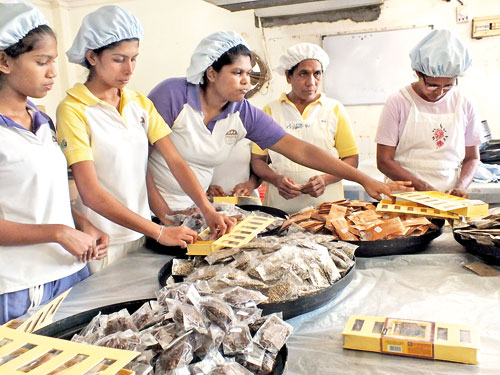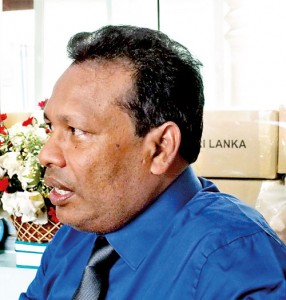Social enterprise making its mark in Sri Lanka
The concept, terminology and organisational model of ‘Social Enterprise’ is relatively new, but is deeply rooted in Sri Lanka. These have been in operation over a 15 year period while cooperative societies have been in operation for more than 50 years.

Workers
In 1902, the US non-profit Goodwill Industries pioneered the notion of ‘a hand-up, not a hand-out’ by developing a social business offering employment to the poor through mending and selling clothing.
In the UK was Rochdale Workers in 1844 who formed a cooperative society – the best way of giving ordinary people control of their own organisation – business, an equal share in decision making and receiving a fair share of the profits.
The British Council based on country-wide research, recently launched ‘a report’ on ‘Social Enterprises ‘in Sri Lanka where it has defined social enterprise by two key criteria: a mission to generate social and community benefits, and the adoption of trading activities to fulfil that mission.
The report was launched during a half day seminar and a panel discussion and, to elaborate how important this is to Sri Lanka in the context of great interest in SMEs in the country, the British Council paved the way to demonstrate two unique role models and are successful which have reached all targets of social enterprise.
One of the two is PODIE (People’s Organisation for Development Import Export) that operates two factories one in Negombo and another in Kadirana (close to Negombo) to process, value-add, package and export pure Sri Lankan spices that are grown according to best methods of organic farming.
The description of PODIE at the launch of the report was made by Tyrell Fernando, Director PODIE and last Saturday the Business Times (BT) was at this Negombo factory for almost half a day to understand this ideal ‘Social Enterprise.’
Mr. Fernando, Ms. Anne Pinto, Administrative Secretary and Ms. Madonna Fernando, Assistant Quality Assurance Manager together with other officials man this factory with about 50 young girls working in machine grinding, drying, separating, weighing, packing, labelling and sorting.
In 1974, Rev Fr Harry Hars, a Dutch arrived in Sri Lanka and was engaged in the missionary work in Negombo. Learning of the plight of the poor farmers in rural Sri Lanka, he observed that one of the striking barriers for them is that they do not have a market for their produce. PODIE was then incorporated as a limited liability company in 1986.
Along with another Catholic Priest Rev. Fr. Emmanuel Fernando were struggling to reach their aim with one problem being finance. However they were able to get hold of 25 individuals to contribute at the rate of Rs 1,000 to raise Rs. 25,000.

Tyrell Fernando
Fr. Harry was able to work out an order for 60 reed-weaved beach mats and at that time the Government was paying Rs. 60 for every Rs. 100 earned in exports as a promotion.
Those who contributed at the rate of Rs. 1000 were paid back at the rate of Rs. 5,000 and the balance from the sale of mats was the initial capital to grow into a massive enterprise of Rs. 200 million investment in a matter of around 40 years.
The factory in Negombo is located at Kadolkelle. Negombo is mostly inhabited with fishermen. They are uneducated and especially the education of the girls of fishermen are normally neglected. Thus some of these girls were selected to work in this factory. They are young and are in their late teens and early 20s. All possible work is automated and working conditions are comfortable, meals provided, nearly half a million loans provided, medical insurance provided and the factory is within walking distance for workers. The work is under strict hygienic conditions.
More than 1,500 farmer families are enrolled with PODIE consisting of farmer groups from up-country and low-country areas – Thibbatugoda, Watinapaha, Dambadeniya, Kuliyapitiya, Vanni-amunukole, Pallebedde, Hammbegamuwa, Uva-mawelagama, Kalugala, Nillamba, Matale, and Kotmale covering provinces of Western, Sabaragamuwa, Uva and Central.
The produce thus purchased covers the entire range – black pepper and white pepper, cinnamon, ginger, coconut, lemon-grass (sera), turmeric, chilies, millet (kurakkan) mustard, sesame (thala), nutmeg, cloves, cardamom, coffee, coco and vanilla.
Some of these are grown under chena cultivation but every single produce is cultivated under strict organic farming and the soil is regularly tested by local and foreign experts.

Packets of spices


